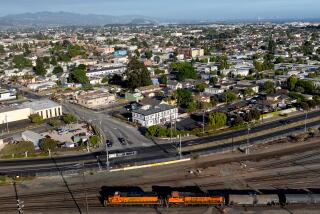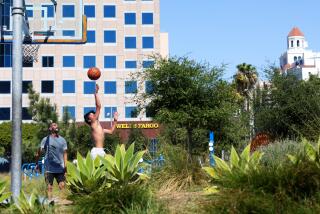Seattle vendor wants kiosk to stand for something
SEATTLE — They were a distasteful breed, all in all, the loud-mouthed young hustlers who sold newspapers on this city’s street corners, and when the 11- and 12-year-old newsboys got driven out in the early part of the last century, the old men and toothless reprobates who replaced them were scarcely any better.
“In every condition of decrepitude, some with two crutches, some with one, some with but one arm, some partially blind and some totally blind,” a county judge wrote in 1937. Still, he allowed, they had “manhood enough to stand on street corners day and night, freezing cold and storm, to sell newspapers for pennies, rather than beg, which, from the evidence, would in some instances be equally or more remunerative.”
Gradually, the old metal shacks that were the boutiques of the news gave way to vending machines and home delivery; the old news wretches died; selling newspapers on the street became a license to go broke.
Enter Benjamin Gant, whose narrow, blue-metal kiosk at the corner of Pike Street and Third Avenue, said to be the last surviving corner newsstand in Seattle, sells newspapers (well, most of them are free), hot coffee, soft drinks and copies of the Constitution and Declaration of Independence (at $5 apiece, these are Gant’s real profit engine).
“If you can keep a level head in all This Confusion, then you just don’t understand the Situation,” says a sign posted prominently on one wall.
Gant, 28, is battling with the city over whether his 87-year-old newsstand -- one of the oldest in Seattle, where the city’s most famous news vendor, the one-legged, trumpet-mouthed labor activist and Newsboys Union founder Frank Turco sold papers for 47 years -- should be razed as an eyesore.
The city and some neighboring merchants are leaning toward the affirmative; Gant is launching a last-ditch effort to save his 6-by-6-foot kiosk by turning it into a memorial for Turco and, by extension, the early 20th century labor union movement that briefly turned Seattle into what many thought would become, in the aftermath of the 1917 Russian Revolution, the next flash point in a world workers’ revolt.
“This guy was an American hero. In 1961, he was bringing up deforestation being a major issue, he was talking about government not representing people’s interests, he was talking about jobs being lost to outsourcing, about juvenile delinquency happening because both parents have to work. Well, these are all things that have come to pass,” Gant said.
“I sit there in my newsstand and I think about the Constitution and all the terrible things that are going on, and it seems like bringing issues to the table will be my contribution to mankind,” Gant said one recent afternoon at a nearby Starbucks, which he normally refuses to patronize, except they give him free hot water for tea.
The original Seattle newsboys, like those who famously did battle in New York by striking against Joseph Pulitzer and William Randolph Hearst at the end of the 19th century, were making barely 2 cents on every nickel paper.
The creation of the Seattle Newsboys Union in 1892 helped impose order among the squabbling hawkers by setting up a system that gave union members exclusive access to certain street corners, according to Roger Simpson, a communications professor at the University of Washington who has written a short history of the newsboys, “How Hustler Democracy Lost to the Power of Property.”
Eventually, with anti-child-labor movements and dwindling profitability, old-timers like Turco, “Whistling Pete” (whose corner was First and Madison) and “Blind Harry” (First and Pine) took over from the boys.
Turco, whose death in 1965 spawned long, affectionate obituaries, was an outspoken national delegate to the American Federation of Labor and a participant in what became a defining moment of organized labor in Seattle and America: the 1919 Seattle general strike.
It was the first time in America that an entire city had essentially quit working, and the nearly weeklong strike was seen -- either fearfully or hopefully, depending on the point of view -- as the first shot in an American workers’ revolution. It wasn’t; but it did prove to be the opening salvo in a period of labor unrest that saw major strikes paralyze the coal, steel and meatpacking industries in cities across the country.
Gant bought the newsstand for $3,000 in 2002, when he was selling subscriptions to the Seattle Times under contract. Only then did he begin to learn about its former proprietor and discover an affinity between Turco’s populist ideals and his own, spawned in part, no doubt, by his mother, who as a young woman joined the Freedom Riders who rode into the segregated South of the 1960s to test new civil rights rulings.
“I’m selling the Constitution, but I don’t consider myself to be really patriotic. Nationalism, to me, is as bad as racism or sexism. I just find it our last defense. The last eight years have been crazy. You’ve got kids in Iraq who were 12 when Bush took office. They don’t know things aren’t supposed to be like this.”
Gant wants to refurbish his newsstand and turn it into “Turco’s Last Stand” -- “I can’t resist a pun,” he says -- a place to sell newspapers and, no charge, a bit of history.
Of course, Gant’s newsstand is a far cry from Turco’s, which operated 24 hours a day and sold most of the city’s more than 13 daily papers. The structure itself was rebuilt in 1972.
Gant, who makes his main living as a beverage marketer, can barely stay open two hours a day. Neither of Seattle’s two big remaining papers have contracted with him as a distributor, so his fare consists mainly of free papers: Seattle Weekly and the Stranger; publications like Seattle Gay News, which he sells for a quarter; the Facts, the voice of the African American community; and the Russian-language Russian World.
The city Transportation Department, which controls sidewalks, has issued an order for Gant to close down, citing the dilapidated appearance of his establishment and his failure to keep it open regularly over the years.
“At this juncture, Mr. Gant’s newsstand is currently in violation of three elements of the municipal code,” said Rick Sheridan, a department spokesman. That said, he added, the city is willing to entertain a new permit application if Gant wants to refurbish the kiosk.
Gant is convinced that if he can raise $23,000 to refurbish the kiosk and turn it into a Turco memorial, the big papers will be happy enough to have a spot on his shelves, and the city will have a lesson in its own ideologically diverse history.
--
More to Read
Sign up for Essential California
The most important California stories and recommendations in your inbox every morning.
You may occasionally receive promotional content from the Los Angeles Times.










